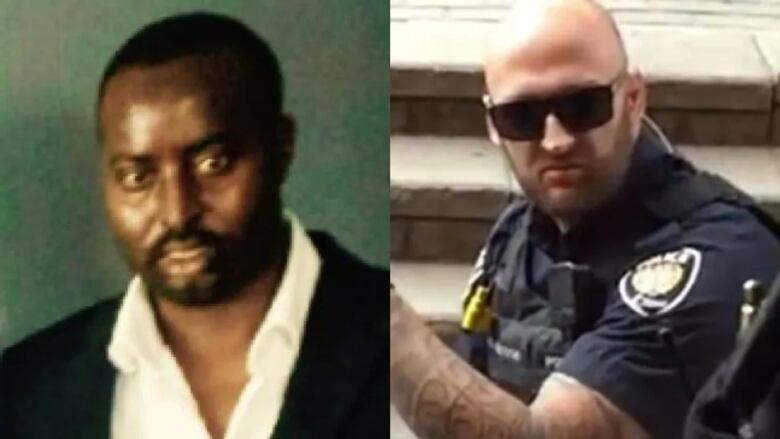'Homicide by heart attack': Pathologist examines how Abdirahman Abdi died
Abdi would not have died July 24, 2016 if not for struggle with police, he says

Abdirahman Abdi died of what Ottawa's head pathologistreferred to as "homicide by heart attack" after a violent arrest in 2016 involving two Ottawa police officers, court heard Tuesday.
Const. Daniel Montsion has pleaded not guilty to manslaughter, aggravated assault and assault with a weapon in connection to the violent altercation on July 24, 2016.
Pathologist Christopher Milroy, who examined Abdi's body after his death, testified in an Ottawa courtroom Tuesday that he found Abdihad died of a heart attack.
But he said Abdi's heart never would have stopped were itnot for the struggle and exertion he experienced during the arrest.
- What the Crown says happened to Abdirahman Abdi
- Montsion did not cause Abdi's injuries, defence argues
In his report, Milroy said his determination is a medical one, not a legal one, and that it will be up to the court to decide if anyone is criminally responsible.
Abdi lost vital signs outside of his apartment building at 55 Hilda St. after a 250-metrefoot chase from police, which ended with him being kicked and hit with a baton by one officerand punched in the head by Montsion.
The head punches continued after Abdi was pushed to the ground as the officers worked to get him into handcuffs. Montsion was wearing gloves with reinforced knuckles at the time.
Injuries mainly on head and face
Abdi's injuries were mainly concentrated on his head and face, Milroyfound.
There was a large bruise on the left side of his head, possiblycaused by a fall, and facial bones were fractured around his nose.
The likely cause of the fractures werethe punches Montsion delivered to hisface, Milroy said in his report.
But he told the court the damage was greater than what he would usually see from a punch wound.
"Typically when I see someone who'sbeen punched, I haven't seen this extent of fracturing," Milroy said in court.
- 'Assault gloves' to be entered into evidence at Montsion trial
- Assault gloves aren't approved police weapons, Montsion trial told
He mused in his report that the damage may have been inflicted by the gloves Montsion was wearing.
The pain Abdi suffered from the punches and the fall, alongwith the physical exertion of running from the police, likely put stress on hisalready damaged heart,Milroysaid.
Defence offers other explanations
The postmortem showedAbdi had no drugs or alcohol in his system including the antipsychotic medication he had been prescribed.
Milroy said thebehaviours Abdi was exhibiting when police were called to the scene back up histheory that Abdi wasn't complying with his medication regimen.
The defence has not yet had a chance to cross examine Milroy, but Montsion's lawyers have already told the court the forensic pathologist they consulted disagrees with Milroy's conclusion.
During previous testimony, the defence lawyers proffered the idea Abdi may have been suffering from excited delirium, a condition that causes erratic behaviour, which may have caused the stress on his heart.
- 'Lawful but awful': Expert weighs in on Const. Montsion's arrest tactics
- Abdirahman Abdi had serious heart problems before death, court hears
They have also offered excited deliriumas a potential justification for Montsion's decision to punch Abdi in the head while he was already on the ground.
The defence hasalso suggested that because of Abdi'sexisting heart condition, he may have died of natural causes.
Milroy's testimony is expected to take several days.
The Crown also expects to call Ontario chief forensic pathologist Dr. Michael Pollanen, who peer-reviewed Milroy's work in this case.












_(720p).jpg)


 OFFICIAL HD MUSIC VIDEO.jpg)
.jpg)



























































































